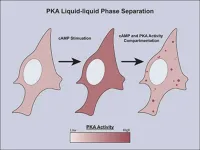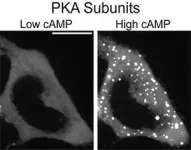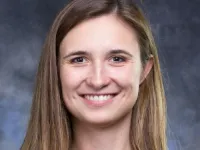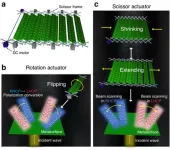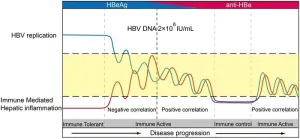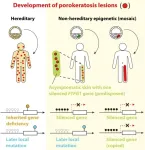(Press-News.org) Healthy cells respond appropriately to changes in their environment. They do this by sensing what’s happening outside and relaying a command to the precise biomolecule in the precise domain that can carry out the necessary response. When the message gets to the right domain at the right time, your body stays healthy. When it ends up at the wrong place at the wrong time, you can get diseases such as diabetes or cancer.
The routes that messages take inside a cell are called signaling pathways. Cells use only a few signaling pathways to respond simultaneously to hundreds of external signals, so those pathways need to be tightly regulated. New research by scientists at University of California San Diego has uncovered a surprising way that cells regulate signaling pathways. They found that when there are too many messages floating around inside a cell, the messengers form liquid droplets, sequestering themselves away where they can do no harm. The work was recently published in Molecular Cell.
“Liquid droplets organize cellular biochemical activities according to spatiotemporal regulation,” says Jin Zhang, Ph.D., professor of pharmacology at UC San Diego School of Medicine and senior author on the study.
The scientists worked with one of the main routes for cellular communication. It’s called the cAMP/PKA signaling pathway for its two main actors — cAMP (cyclic adenosine monophosphate) and PKA (cAMP-dependent protein kinase). When cAMP receives a signal from the cell’s surface, it activates PKA. PKA relays the message to the appropriate domain, whether it’s telling a specific gene to produce more protein or stimulating an enzyme to maintain a healthy level of glucose in the blood.
It’s not that simple, though. PKA carries messages to hundreds of different domains. According to Zhang, “At one moment, PKA needs to be active on the plasma membrane. But the next moment, it needs to come off the plasma membrane and be active on the mitochondrial membrane. Ten minutes later, it really needs to be in the nucleus to turn on transcription.”
To complicate matters, sometimes cells turn on too much cAMP and PKA. When that occurs, cell signaling becomes hyperactive and indiscriminate. Explains Zhang, “Different microdomains control different things. Let’s say you want the cAMP level to be high around calcium channels but low 10 nanometers away. How does the cell achieve that? By controlling cAMP.” But, she goes on, “PKA is the same. Typically, it’s recruited to specific domains by anchoring proteins. But if the PKA activity is too high, it will activate domains it’s not supposed to be activating. That’s loss of specificity.”
That’s why, according to the new research, cells form liquid droplets to ensure that the right message gets to the right domain at the right time. When the scientists analyzed the composition of the liquid droplets, as well as the timing of when they were formed, they found that cells formed the droplets using a subunit of PKA when too much cAMP and PKA were being turned on. In that way, the droplets sequestered the excess cAMP and PKA and tamped down non-specific signaling.
In previous work, the authors found that a rare type of liver cancer called Fibrolamellar Carcinoma (FLC) blocks formation of these liquid droplets, resulting in uncontrolled cell signaling. “We think that disappearance of the liquid droplets is one major contributor to this hyperactive signaling that leads to tumorigenesis,” said Zhang.
FLC is a rare but devastating disease. It typically affects people under the age of 40 with healthy livers. The authors of this paper are hoping to investigate whether other cancers also cause a loss of liquid droplets and what the molecular mechanisms are behind it. Their ultimate goal is to design a molecular therapeutic to treat FLC — “anything,” says Zhang, “that helps us address the unmet needs of FLC patients.”
The authors of this study include Julia C. Hardy, Emily H. Pool, Jessica G.H. Bruystens, Xin Zhou, Qingrong Li, Daojia R. Zhou, Max Palay, Gerald Tan, Lisa Chen, Jaclyn L.C. Choi, Ha Neul Lee Dong Wang, Susan S. Taylor, Sohum Mehta, Jin Zhang at University of California San Diego and Stefan Strack at University of Iowa.
This work was supported by the National Institutes of Health and Fibrolamellar Cancer Foundation.
The authors declare no competing interests.
# # #
END
Liquid droplets shape how cells respond to change
Cells form liquid droplets to prevent dysfunctional signaling and deadly diseases
2024-04-22
ELSE PRESS RELEASES FROM THIS DATE:
COS Mason researchers translating research into practice to create climate-ready communities across Virginia
2024-04-22
COS Mason Researchers Translating Research Into Practice To Create Climate-Ready Communities Across Virginia
Four Mason researchers received funding for: “ART: Translating Research into Practice to Create Climate-Ready Communities Across Virginia.”
Leah Nichols, Executive Director, Institute for a Sustainable Earth, Research and Innovation Initiatives; James Kinter, Professor, Climate Dynamics, Atmospheric, Oceanic and Earth Sciences (AOES); Director, Center for Ocean-Land-Atmosphere Studies (COLA); Luis Ortiz, Assistant Professor, AOES; and Celso Ferreira, Associate Professor, Sid and Reva Dewberry Department of Civil, Environmental, and Infrastructure Engineering, are ...
Hao receives funding for NOAA AMSU-A CDR Products Support
2024-04-22
Hao Receives Funding for NOAA AMSU-A CDR Products Support ...
Life goals and their changes drive success
2024-04-22
“Where is my life going?” “Who do I want to be?”
As future-thinkers, adolescents spend significant time contemplating these types of questions about their life goals. A new study from the University of Houston shows that as people grow from teenagers to young adults, they tend to change the importance they place on certain life goals, but one thing is certain: The existence of high prestige and education goals, as well as their positive development, can drive success.
“Adolescents who endorsed higher levels of prestige and education goals tended to have higher educational attainment, income, ...
Newmetasurface innovation unlocks precision control in wireless signals
2024-04-22
Researchers have unveiled a technology that propels the field of wireless communication forward. This cutting-edge design, termed a reconfigurable transmissive metasurface, utilizes a synergistic blend of scissor and rotation actuators to independently manage beam scanning and polarization conversion. This introduces an innovative approach to boosting signal strength and efficiency within wireless networks.
Reconfigurable metasurfaces are transforming wireless communication by adjusting electromagnetic (EM) wave characteristics such as amplitude, phase, and polarization. These planar arrays enhance wave control, boosting functionalities ...
The relationship between viral replication and the severity of hepatic necroinflammatory damage changed before HBeAg loss in patients with chronic hepatitis B virus infection
2024-04-22
Background and Aims
Disease progression of chronic hepatitis B virus (HBV) infection is driven by the interactions between viral replication and the host immune response against the infection. This study aimed to clarify the relationship between HBV replication and hepatic inflammation during disease progression.
Methods
Two cross-sectional, one validation cohort, and meta-analyses were used to explore the relationship between HBV replication and liver inflammation. Spearman analysis, multiple linear regression, and logistic regression were used to explore the relationship between variables.
Results
In ...
Sleeter to receive funding for website project
2024-04-22
Nathan Sleeter, Research Assistant Professor, History and Art History, Roy Rosenzweig Center for History and New Media (RRCHNM), is set to receive funding for: “American Indian Science and Engineering Society (AISES) at 50 website.”
RRCHNM researchers will develop a website that will tell the story of AISES’s first 50 years, its founding mission, its growth, and the individuals who have been part of its work supporting American Indians in STEM. Sleeter will serve as project director.
The researchers will also conduct and record oral history ...
Alem conducting PRNT analysis of samples from Athari Biosciences
2024-04-22
Farhang Alem, Interim Director of the Biomedical Research Laboratory, Institute for Biohealth Innovation, received funding for: “PRNT Analysis of Samples from Athari BioSciences.”
Researchers with the Biomedical Research Laboratory will perform Plaque Reduction Neutralization Tests (PRNTs) on Athari patient serum samples with parameters defined by Athari. They will also produce and deliver a report containing all patient serum sample titer results for SARS-CoV-2.
PRNT analysis is a serological test that utilizes the ability of a specific antibody to neutralize a virus, and in turn, prevent the virus ...
Mosaics of predisposition cause skin disease
2024-04-22
Clarifying the cause of a skin disease led to the discovery of a new disease-causing gene, a new category of diseases, and new perspectives for both counseling and therapy. The Kobe University discovery is the first time that epigenetic silencing, the “switching off” of an otherwise intact gene, has been recognized as the cause for a skin disease.
Porokeratosis is a skin disease that leads to the development of annular or circular, red and itchy lesions. In some individuals, these develop all over the body, in some localized in lines, and in some only in one or very few spots. Kobe University dermatologist KUBO Akiharu previously ...
Preoperative GLP-1 receptor agonist use and risk of postoperative respiratory complications
2024-04-22
About The Study: Preoperative use of glucagon-like peptide 1 receptor agonists (GLP-1 RAs) in patients undergoing emergency surgery was not associated with a higher risk of postoperative respiratory complications compared with patients not using GLP-1 RAs. The results of this study suggest that liberalizing withholding guidelines for GLP-1 RAs preoperatively should be considered.
Authors: Anjali A. Dixit, M.D., M.P.H., of the Stanford University School of Medicine in Stanford, California, ...
International scientific collaboration produces a comprehensive atlas of human skeletal muscle aging
2024-04-22
In a world with rapidly aging societies, there’s a need for a detailed understanding of the cause and progression of diseases associated with aging. Skeletal muscle is the key motor system in the human body and plays a pivotal role in body metabolic regulation. With increased age, particularly in individuals over 80 years old, skeletal muscles suffer from sarcopenia, a progressive loss of muscle mass and function. Sarcopenia not only increases the individual’s disability but also plays a role in the rapid decline of general functions in the elderly, making them frailer. The underlying ...
LAST 30 PRESS RELEASES:
Mayo Clinic study finds single dose of non-prescribed Adderall raises blood pressure and heart rate in healthy young adults
Engineered immune cells show promise against brain metastases in preclinical study
Improved EV battery technology will outmatch degradation from climate change
AI cancer tools risk “shortcut learning” rather than detecting true biology
Painless skin patch offers new way to monitor immune health
Children with poor oral health more often develop cardiovascular disease as adults
GLP-1 drugs associated with reduced need for emergency care for migraine
New knowledge on heritability paves the way for better treatment of people with chronic inflammatory bowel disease
Under the Lens: Microbiologists Nicola Holden and Gil Domingue weigh in on the raw milk debate
Science reveals why you can’t resist a snack – even when you’re full
Kidney cancer study finds belzutifan plus pembrolizumab post-surgery helps patients at high risk for relapse stay cancer-free longer
Alkali cation effects in electrochemical carbon dioxide reduction
Test platforms for charging wireless cars now fit on a bench
$3 million NIH grant funds national study of Medicare Advantage’s benefit expansion into social supports
Amplified Sciences achieves CAP accreditation for cutting-edge diagnostic lab
Fred Hutch announces 12 recipients of the annual Harold M. Weintraub Graduate Student Award
Native forest litter helps rebuild soil life in post-mining landscapes
Mountain soils in arid regions may emit more greenhouse gas as climate shifts, new study finds
Pairing biochar with other soil amendments could unlock stronger gains in soil health
Why do we get a skip in our step when we’re happy? Thank dopamine
UC Irvine scientists uncover cellular mechanism behind muscle repair
Platform to map living brain noninvasively takes next big step
Stress-testing the Cascadia Subduction Zone reveals variability that could impact how earthquakes spread
We may be underestimating the true carbon cost of northern wildfires
Blood test predicts which bladder cancer patients may safely skip surgery
Kennesaw State's Vijay Anand honored as National Academy of Inventors Senior Member
Recovery from whaling reveals the role of age in Humpback reproduction
Can the canny tick help prevent disease like MS and cancer?
Newcomer children show lower rates of emergency department use for non‑urgent conditions, study finds
Cognitive and neuropsychiatric function in former American football players
[Press-News.org] Liquid droplets shape how cells respond to changeCells form liquid droplets to prevent dysfunctional signaling and deadly diseases
